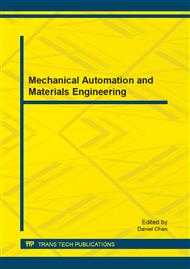p.429
p.434
p.439
p.444
p.449
p.453
p.458
p.465
p.470
The Simulation and Application in Eliminating Noise of Adaptive Filter
Abstract:
In practical application, signal and noise statistical characteristics are often unknown or not informed, fixed filter is difficult to process these signals and the filtering effect is poor. To address the issue, this paper design the adaptive filter which is based on the algorithm LMS and RLS. By simulation in the MATLAB environment, we can compare the analytical results of the two algorithms and observe the effect of noise elimination, the adaptive filter can be a good noise suppression.
Info:
Periodical:
Pages:
449-452
DOI:
Citation:
Online since:
August 2013
Authors:
Keywords:
Price:
Сopyright:
© 2013 Trans Tech Publications Ltd. All Rights Reserved
Share:
Citation:


